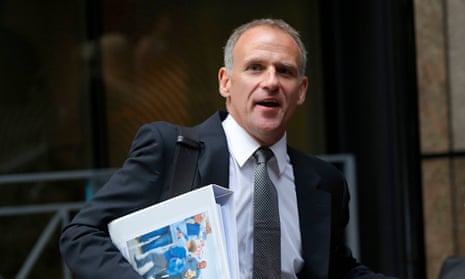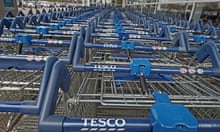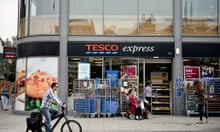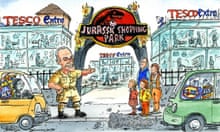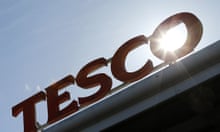It is the sixth biggest corporate loss in British history and the largest ever in British retailing, just the latest in a lengthening list of disasters. Tesco’s £6.4bn fall from grace is in the same league as BP’s multibillion-dollar compensation for the oil spills in the Gulf of Mexico (though not quite up there with RBS’s bankruptcy in 2008).
Of course, companies make mistakes: their rise and fall is a healthy and inevitable part of the rhythm of capitalism. But Tesco’s travails go beyond that. They are part of a larger pattern that takes us to the heart of how our economy and society are run. This is now not only revealing itself as a breakdown of trust in business, but seeping into the fragmentation of support for our principal parties and the accompanying dysfunctional political system. Run a country in the interests of the top 0.1% and sooner or later something gives.
For the past decade, Tesco, like almost every other British plc, has been organised as a profit machine, a company whose focus transmuted from serving customers and building a company to serving shareholders and driving up directors’ pay. The £6.4bn loss is the price tag of the consequent misjudgments, brought together in the oldest trick in the corporate book – a “kitchen sink” moment in which the incoming, transient management crystallises every loss. This allows the base from which it starts to be so low that there can only be improvement. But the terms are wholly financial and don’t answer the bigger question of what Tesco is for.
In fairness, part of Tesco’s problem is that Britain’s retailing landscape is being transformed by two different challenges – online shopping and discount retailers Aldi and Lidl, whose market share has doubled in the past five years to more than 10%. Tesco’s grandiose out-of-town hypermarkets are now stranded behemoths no longer attracting, as they once did, shoppers who now prefer to go online. Tesco has recognised the reality, stopped building new stores, closed others and written down the value of its fixed assets by £4.7bn.
But Aldi’s and Lidl’s success is rooted in something more profound than just capitalising on newly cost-conscious, financially pressed consumers. They are privately owned businesses that think long term and whose business purpose, enshrined by the owners, is to focus on a very narrow range of goods they can sell at high volumes and thus price incredibly keenly. British supermarkets, having to please shareholders with no such commitment, can never price so keenly even if they could match Aldi’s and Lidl’s logistical capacity and focus.
But Tesco’s initial response was not even to try – it was to wangle its financial numbers, exploiting its market dominance. Essentially, it offered its suppliers numerous wheezes – all of which Tesco charged for – to position their goods on its shelves slightly more advantageously than others. It then booked the profits early and now has set aside £200m for overstating profits, as well as suffering inquiries from the Serious Fraud Office. Among other write-downs, it wants to close its current pension scheme, which offers guaranteed pensions, to be replaced by one that displaces all the investment risk on to its workers.
City opinion is divided on whether Tesco’s new management can reverse a halved share price. Too few pose the question in different terms. What kind of company will best serve shopping needs in the next 20 years – and how, if at all, could Tesco get from where it is to where it needs to be? Tesco would be much better placed if it had owners as committed to its purpose as Aldi’s and Lidl’s to help it make what will inevitably be a risky transformation. But it doesn’t – and nobody discusses how this sort of company could change, a notable absence from the election campaign.
As a result, Tesco will have to transfer lots of pain and risk to its workers. There will be more redundancies, pay freezes and pay cuts, although expect few parallel sacrifices and pain for the directors’ team. A former HR director of one of our top retailers tells me about the shocking preoccupation of directors with their own pay and bonuses, even as they cut pay and jobs of their workforce. In this world, it is the directors who make money, win or lose, and employees who accept more pain and risk.
Tesco is not alone. This is how too much of business works in 2015. The justification of capitalism is not that it enriches the top 0.1% and the wealth trickles down. Its justification is that a plurality of companies experiment in solving human problems and so create worthwhile value, which capitalism can do better than any other system. Tesco went wrong because of a very particular British ownership and financial architecture that places no value on this social, human mission but sees its duty as only to maximise the share price for a floating body of shareholders. And now Tesco is trying to reinvent itself in the same hostile system.
This truth has been dodged for 35 years. Business has been allowed to go rogue with the institutions that defend working-class lives – from unions to low-cost housing, building societies to co-operatives – dismantled as alleged obstacles to wealth generation. On top, the coalition has reduced in-work benefits – the last defence to millions of lives – by a stunning degree, so that in-work poverty is rising explosively. The result? A distrusted, low-investment business sector and too many of the workforce in insecure, low-wage jobs unable to make ends meet.
The Conservative party, principal author of this, has, beyond the southern shires and outer suburbs, become a toxic brand unable to talk persuasively about what it wants to build or create because everyone knows that this ideal is not in its Thatcherite DNA. Its support is narrowing further as business deserts it over Europe. Meanwhile in Scotland, Labour canvassers report that the working class has simply given up on it. It now looks to the SNP, cleverly combining nationalism with social democracy. Meanwhile, English working-class support is becoming ever more qualified. The less capitalism works for ordinary people, the less the chances of either party winning a majority.
Ed Miliband’s Labour party, still just about a national party and offering a mild, one-nation social democratic programme that addresses some of our economic and social dysfunctions, is nearer confronting this reality than the Conservatives. It is why Ed Miliband is more likely to form a minority government than David Cameron. But the bigger lesson is surely that democracy’s job is to ensure capitalism delivers its promise. With the country threatened even with break-up, Britain and its political class are paying a high price for giving up on that essential task.
